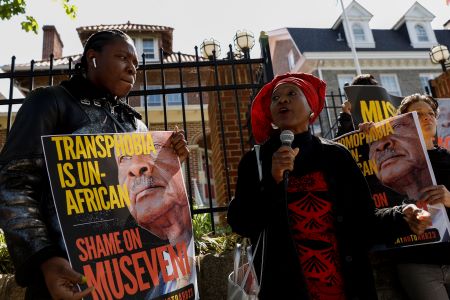UGANDA’S PARLIAMENT has approved a new version of an anti-LGBTQ bill, eliminating a clause that seemed to criminalize the act of identifying as LGBTQ.
After returning the bill to parliament last month, President Yoweri Museveni asked for amendments to make clear the difference between merely identifying as LGBTQ and actively engaging in homosexual activities.
Criticism
The new bill maintains most of the stringent measures included in the original bill passed in March, and which faced extensive international criticism.
Under the newly proposed law, the offense of so-called “aggravated homosexuality,” which includes sexual relations involving individuals with HIV, minors, and other vulnerable groups, would be subject to the death penalty. Conviction for “attempted aggravated homosexuality” could result in a 14-year imprisonment, while the act of “attempted homosexuality” carries a maximum sentence of 10 years.

Human rights campaigners have expressed concerns about the legislation’s potential consequences, as it also introduces a provision that allows a 20-year jail term for campaigning to protect LGBTQ rights.
Activists and campaigners argue that this provision could effectively criminalize any form of advocacy in support of the rights of lesbian, gay, bisexual, transgender, and queer individuals.
Homosexuality is presently considered illegal in the East African nation under a longstanding law inherited from the colonial era, which categorizes certain sexual acts as being “against the order of nature” and penalizes them with life imprisonment.
Following its approval by lawmakers yesterday (May 2), the bill will now be returned to President Museveni, who possesses the authority to either sign it into law or veto it.
Warning
Pressure is mounting on President Museveni from the international community to reject the legislation. The United States has warned that there could be economic repercussions if the bill is enacted, while a group of United Nations experts has previously characterized the earlier version passed by lawmakers as a “flagrant violation of human rights.”
Following the passing of the original bill in March Tigere Chagutah, Amnesty International’s Director for East and Southern Africa, said: “This deeply repressive legislation will institutionalise discrimination, hatred, and prejudice against LGBTI people – including those who are perceived to be LGBTI – and block the legitimate work of civil society, public health professionals, and community leaders.
“Instead of criminalising LGBTI people, Uganda should protect them by enacting laws and policies that align with the principles of equality and non-discrimination enshrined not only in Uganda’s Constitution, but also the African Charter on Human and Peoples’ Rights.”


Comments Form
2 Comments
At last some wonderful news from Africa.
The Elected Parliamentarians of Uganda, and the President, have placed honouring their democratically revealed will to protect their African tradition: culture and youth, from being beguiled; abused, and exploited from wealthy and privileged western tourists and others.
It is not often I am able to congratulate the decision of an African government.
This bill is controversial for Western Caucasian Governments; Western institutions, and Banking institutions; who have taken measures to forced the homosexual creed on the African governments and people.
African governments are merely upholding their traditions, and placing the protection of their children as their singular priority.
The governments and people of African need to be celebrated for placing the protection of their children as their main priority.